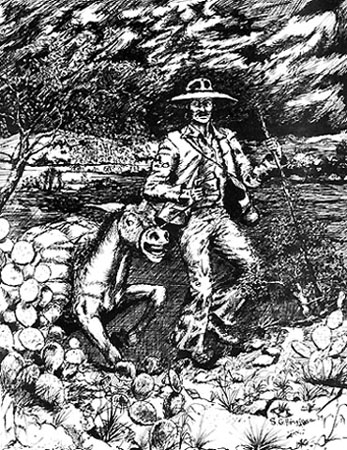
Los Tequileros

With the implementation of the Prohibition Act of 1919 in the United States, the nature of smuggling changed dramatically. Smuggling American goods into Mexico was replaced by the smuggling of alcohol into the United States. This became an extremely popular money-making enterprise. The smugglers of hard alcohol from Mexico to the U.S. became knows as “los tequileros”. Unlike massive flocks of men that rode with Mariano Resendez, the tequileros usually traveled in groups of three or four. On the Mexican side of the border, guards allowed the passing of these smugglers due to their disrespect of Anglo law. While America had border restrictions in place, these regulations were often disregarded due to a lack of river guards to enforce these laws. Leftover feelings from the previous period of intercultural conflict contributed to Mexicans association of resentment toward the “rinches” or Texas Rangers with resentment toward the border patrolmen. Therefore, the smugglers, as well as the general population of Mexico, regarded smuggling alcohol into America and fighting the rinches as a respectable and honorable act of courage. According to Paredes, this corrido emphasizes the tequileros battle with the rinches as opposed to the actual smuggling of contraband. This attributes an image to the tequileros not of criminals, but instead of heroes of intercultural conflict.
|
El día de noviembre, Salieron desde Guerrero Al llegar al Río Grande Le echan el invite a Leandro Al fin de tanto invitarlo Les dispararon a un tiempo, Pues Silvano con dos tiros El capitán de los rinches Los rinches son muy valientes, Ya con ésta ahí me despido |
On the third day of November, They left from Guerrero When they reached the Rio Grande, They asked Leandro to go with them, They kept on asking him to go, The rinches fired a volley at them at once, Silvano, although hit by two bullets, The captian of the rinches The rinches are very brave, Now with this I bid farewell |
The protagonists of “Los tequileros” are seen as extensions of the heroes of intercultural conflict. Likewise, their enemies, the American border patrolmen, still live up to their reputation as “rinches cobardes.” This epithet stems from the stereotype that the Americans shoot smugglers first and then ask questions later. In this corrido specifically, the “rinches” sneak up on the tequila runners and kill them like deer, rather than fight them “pecho a pecho.”